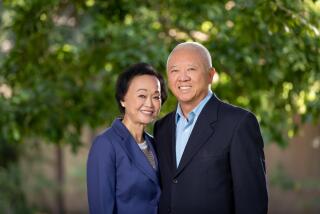City of Hope Benefactor : Louis Tabak, Fighter of Cancer, Dies at 91
- Share via
Louis Tabak, a product of the slums of New York who once estimated that he had raised “15, maybe 20 million dollars” for City of Hope, died at that medical center Thursday of cancer, a disease he had spent many of his later years trying to eradicate.
Tabak, whose life became a literal “rags to rags” story after he worked his way from poverty to amass a fortune in the garment industry, was 91.
Tabak was 7 when he arrived in New York City from Poland, then part of Russia. His sisters worked in cigar factories while he did odd jobs after school. The man who in 1962 would co-found Manufacturers (now Mitsui Manufacturers) Bank studied business after World War I Army service, when he taught trigonometry to prospective artillery soldiers (“so they wouldn’t hit the horses,” he remembered in a 1982 interview).
After a year at New York University he began as a garment salesman, moving to Los Angeles as the Western representative for Happy Home Washdresses (“98 cents each”). With his brother, Max, who like many garment workers of that time was to contract tuberculosis, they launched Tabak of California, believed the first of the West Coast sportswear manufacturers. It became such a success that when Max Tabak was admitted to what once was the Jewish Home for Consumptives (now City of Hope), Louis was able to begin his philanthropic efforts in earnest.
The Art of Persuasion
Doctors had told Max Tabak that he had only months to live. But he lived seven years longer than that, and his brother credited the care he received at the Duarte center for those additional years.
In 1933, five years before his brother’s death, Louis Tabak was named to City of Hope’s board of directors, and it was then that he began perfecting the art of persuading people to donate to his favorite charity.
He helped found the Merchants Club, a support group that not only solicited donations for City of Hope but whose members also discussed whether their pledges were giving as much as they could. He helped sponsor balls and fashion shows and remembered one occasion when a Santa Barbara hotel at which he had staged a benefit later refused to rent him a room because he was Jewish.
With Tabak’s help City of Hope, which should rightfully have closed its doors when a cure for tuberculosis was discovered in 1946, was converted into a national medical research center specializing in major diseases with an emphasis on cancer.
He was president three times and was named honorary president for life in 1963, and when he wasn’t raising money for City of Hope he was writing personal checks. A plaza was named for Tabak and his late wife, Fannye.
But he also remained close to his business and helped form California Apparel Creators, a group of manufacturers that placed “made in California” clothing on racks across the nation.
Opened Bank in 1962
And in 1962, when Tabak and Seymour Graff, a fellow garment manufacturer, decided that their industry required greater understanding from the financial community, they started Manufacturers Bank, the first new bank in downtown Los Angeles in 35 years. The bank was acquired by Mitsui Bank Ltd. of Japan in 1981, but its major depositors continue to include garment industry leaders, said Leonard Weil, president and chief executive officer.
Tabak’s interest in the Duarte facility continued until the day before he died. The switchboard reported that he was making calls around the complex where he now found himself a patient.
Tabak, who is survived by two daughters, Cece Robman and Micky Culleton, seven grandchildren and six great-grandchildren, said giving money is something people should enjoy, something they “should do while they’re alive. Don’t tell me you are going to leave us money in your will.”
A funeral service will be held at noon Sunday at Hillside Memorial Park. In lieu of flowers, the family asks contributions to, of course, the Merchants Club of City of Hope.
More to Read
Sign up for Essential California
The most important California stories and recommendations in your inbox every morning.
You may occasionally receive promotional content from the Los Angeles Times.












